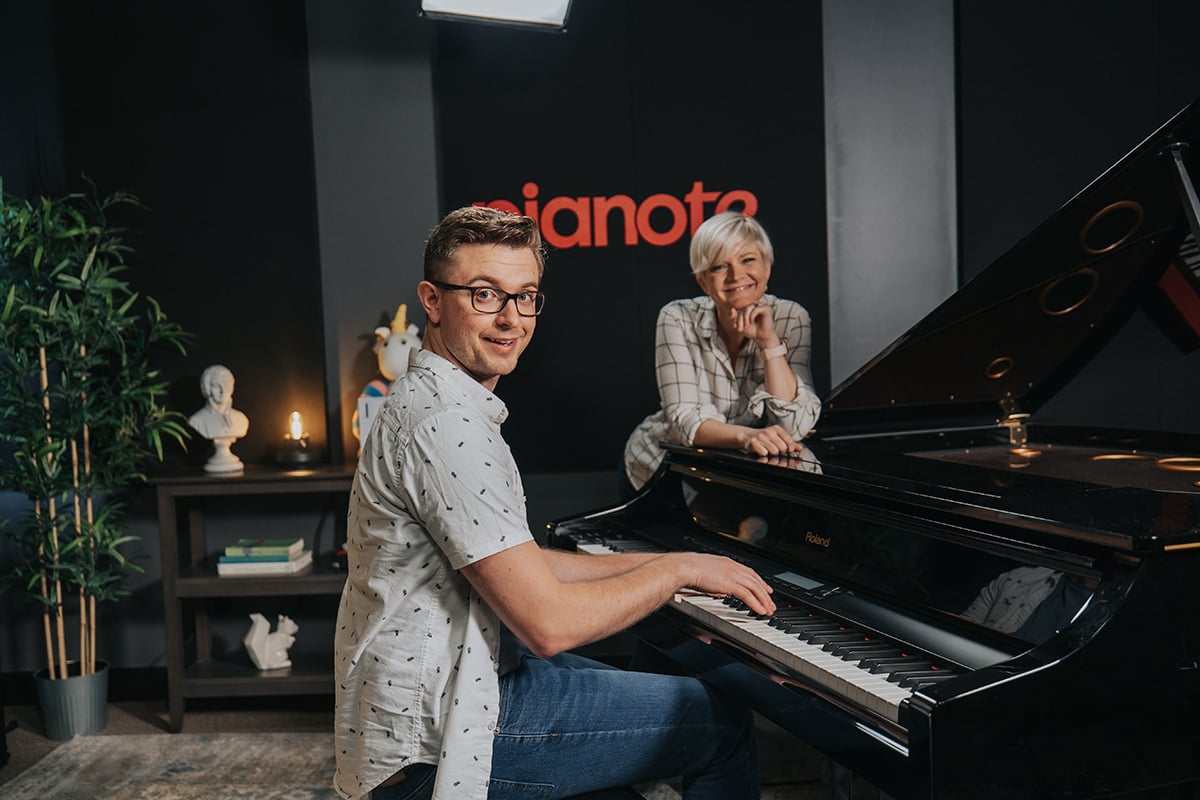
So you’ve heard that it’s possible to learn piano online! But it sounds too good to be true. Will something go wrong if you didn’t learn how to play piano the way your grandfather did, with a teacher sitting beside you?
Well, if you’re asking these questions, you’ve come to the right place!
You CAN learn piano online. But that doesn’t mean you can just search up a song on YouTube, follow a tutorial, and magically know how to play.
In this article, we’ll discuss ways to successfully learn piano with the internet. We’ll show you tips, tricks, and best practices to keep you motivated and progressing. We’ll also cover the benefits and drawbacks of online learning and share how you can surmount common challenges.
Table of Contents
Now, before we start, let’s address the elephant in the room. Pianote is an online piano learning platform, so we’re obviously biased towards our own learning method.
But we’re musicians first, salespeople second. Our #1 priority is getting you to enjoy learning piano. And as you’ll see later, an online method like ours can work alongside other methods.
Get free lessons, tips, and piano news delivered to your inbox every week. Subscribe to The Note!
Yes, you can learn piano online!
The benefits of online learning are endless. You eliminate commuting, rigid schedules, high tuition, and even unwanted teaching styles.
Let’s face it: piano lessons are expensive. Anywhere from $20/hour to $100/hour, to be precise. Which adds up. $50/hour for weekly hour-long lessons means an annual tuition fee of $2,600.
Compare that to a Pianote membership of $197/year. And we haven’t even factored in additional costs like gas, transit, books, and supplies.
Any online learning method (not just Pianote) will be dramatically more affordable than in-person one-on-one lessons.
In-person lessons means aligning your schedule with that of another human, which can be challenging. If you’re a parent, working professional, student, or other busy person, flexibility is important.
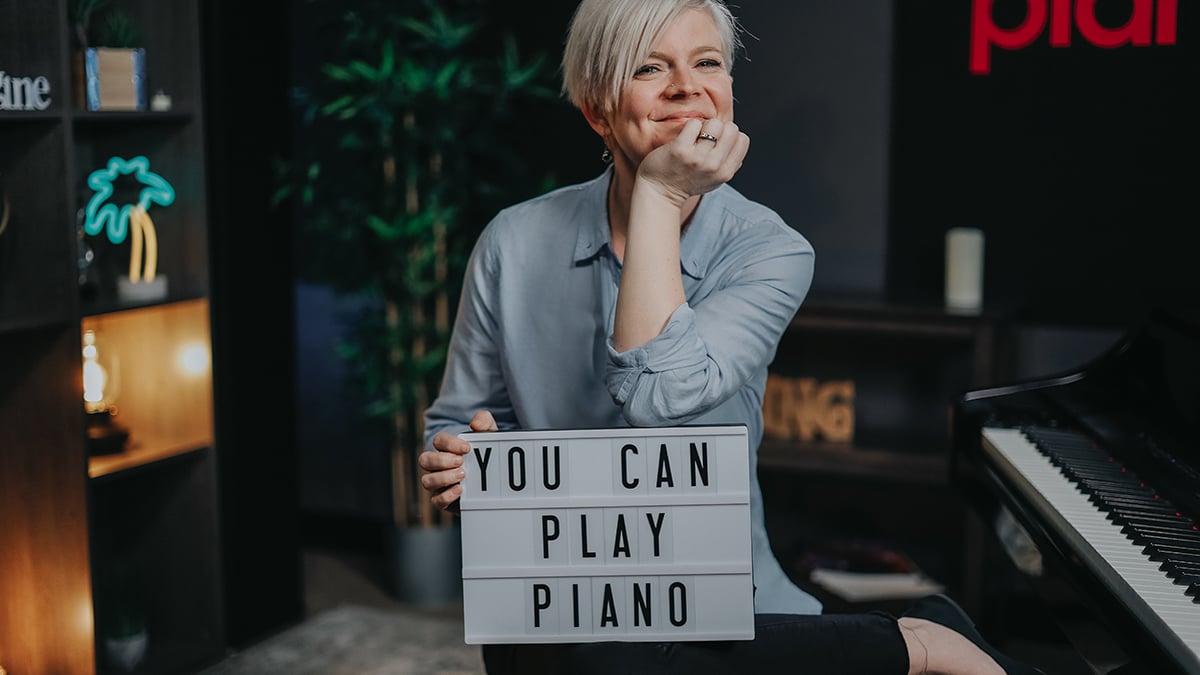
Get started on the right foot (or rather, hand). Here are four FREE lessons that will take you from sitting down on the piano for the first time to playing your first song.
Taking online lessons, however, means you can learn wherever you want, whenever you want. If you get sick, you don’t have to worry about losing money by cancelling a class too late. And if you feel especially in the mood one day, you can marathon several lessons at no inconvenience to your instructors.
For the longest time, there was only one way to learn piano: hire a teacher. This is the way Lisa, Sam, and I learned music before the heyday of internet learning.
Now, there’s nothing inherently wrong about this approach. But it is frustratingly one-size-fits-all. Most traditional piano teachers focus on teaching students how to read music using traditional classical pieces. But not everyone thrives from this approach.
With an online library of lessons, you can tailor your learning experience to YOUR needs. If you don’t like classical music, don’t stress over the grand staff. Learn how to use chord charts and play by ear first.
If you want to play jazz, focus on theory and improvisation lessons.
And if you do like classical music, learn how to read sheet music and follow a classical learning path.
Do you want to learn directly from a pianist who’s played with Stevie Wonder and Beyoncé?
With online learning, you can access the expertise of world-class musicians without leaving the comfort of your home. For example, with our Coaches feature, Pianote members can ask advice and get coaching from highly accomplished pianists.
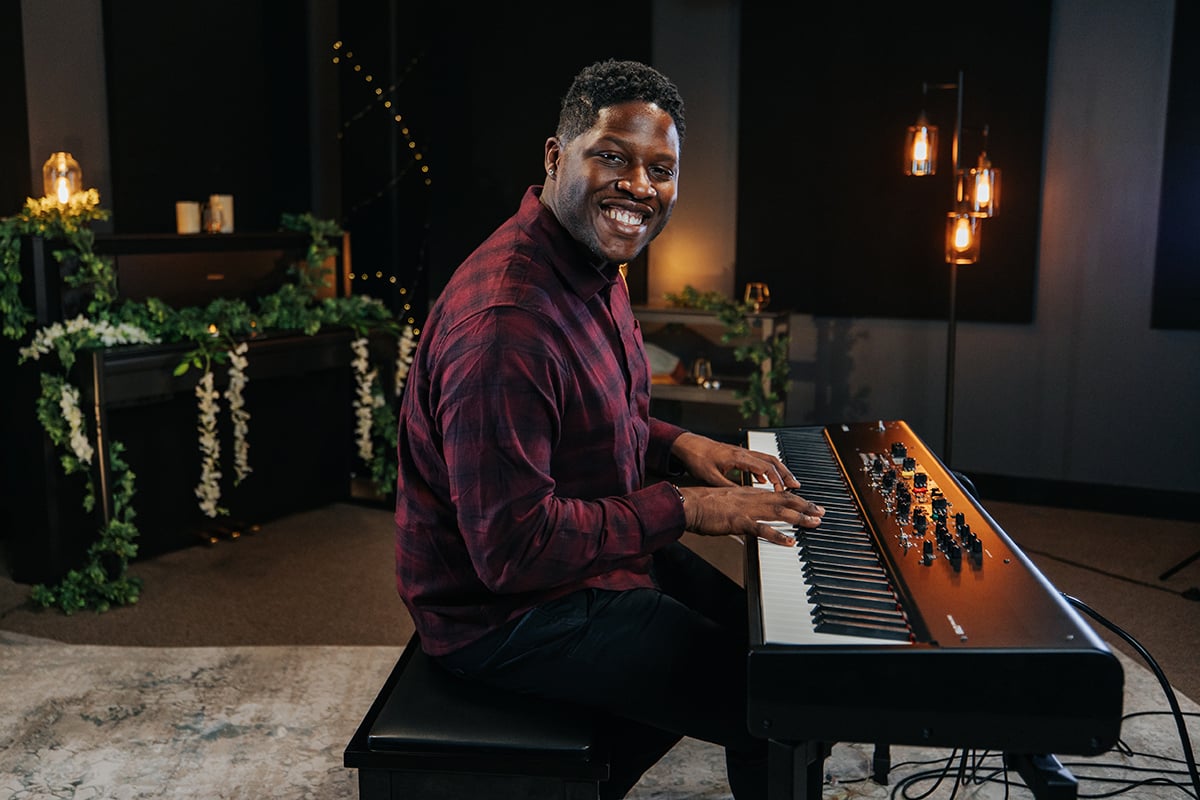

In conclusion, online learning is perfect for individuals who:
But online learning isn’t without its challenges, so we’ll transparently address those next.
There are disadvantages to online lessons, but these challenges are surmountable.
The obvious downside to learning online is that you don’t get instant feedback from an expert. This is problematic because if you don’t have proper technique, you can build bad habits, not play as effectively, or even injure yourself.
But the good news is that many of the problems you’ll encounter while learning online can be solved.
Playing music is more than knowing what key to press. It’s about expression, technique, interpretation, and so much more. You won’t get this type of feedback from learning on your own, and you may make mistakes you don’t even notice.
A professional piano teacher can give you invaluable guidance based on a lifetime of experience. It’s a disadvantage not to have such a resource, but you’re not doomed if you’re alone!
In my experience, the online piano community is extremely supportive and can help you catch things you miss.
For example, I recorded a performance and posted it to Reddit. Someone then kindly pointed out that I had missed ties. Having learned that piece on my own without a piano teacher, I had completely missed these details. I was so steeped in the habit of not playing ties that it took me clarifying with the commenter to pinpoint my mistake. I wouldn’t have caught my mistake without a second pair of ears.
Here are some popular online piano communities you may consider joining:
Technique is difficult to learn online. You really need an expert to watch your posture and nip mistakes in the bud before they become bad habits. And bad technique can be costly. You can get fatigue, not play as nimbly, or even injure yourself.
Posture and technique are some of the most common things people point out on comments posted in learning forums. So, online communities can help with this too.
Otherwise, you can study master pianists like Martha Argerich and Arthur Rubinstein. Notice how relaxed their bodies are and try to spot nuances in their technique. (Pro tip: avoid flattened, stiff fingers and drooping wrists at all costs!)
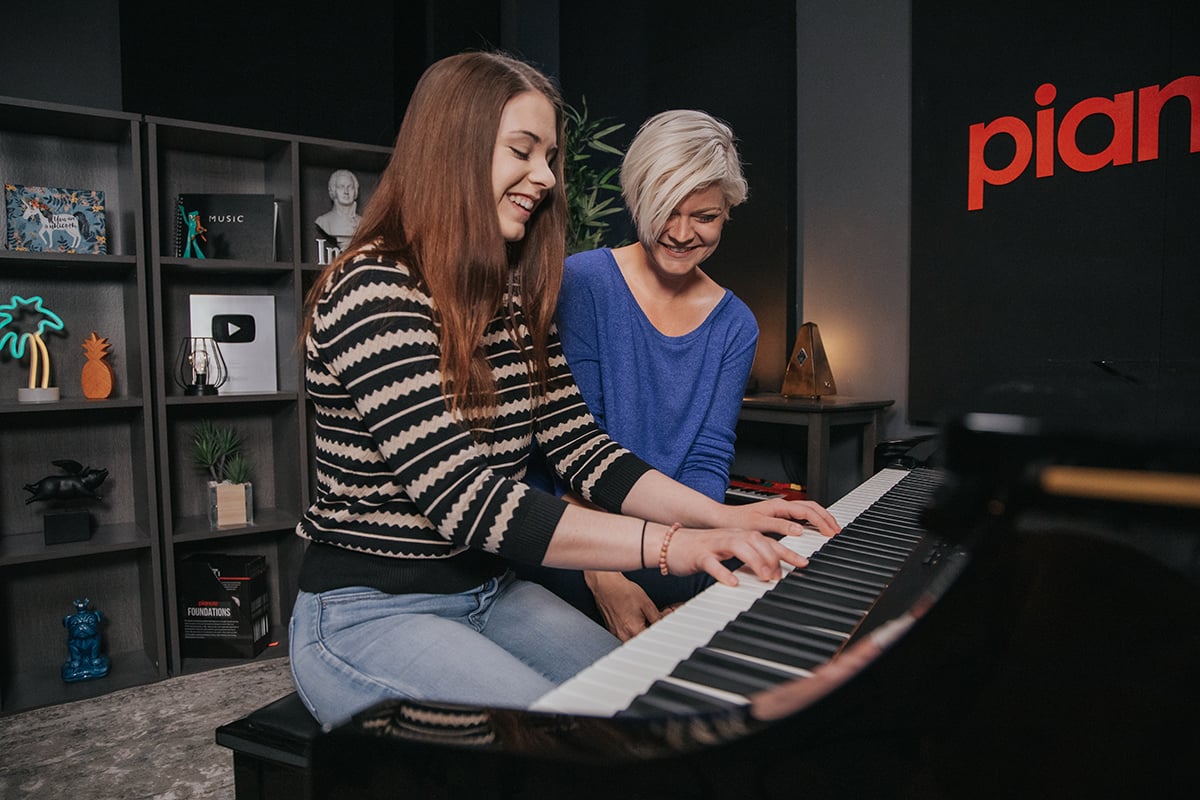
Many people like the flexibility of learning at their own pace and not having a naggy teacher assign homework. But some people like structure. And having homework can push you to accomplish your goals.
Structure can be good for younger students who have yet to establish work habits. But they can also be discouraging. You’ve probably heard stories about young people being forced into piano lessons and then hating music (and their parents). So, if you decide to take this route with a young person, be careful about your teacher selection and make sure their approach is compatible with the student’s.
Exams and diplomas may be useful if you want to build a career in music. But many post-secondary programs prefer auditions over a formal certificate, so please do your research before committing to a gruelling exam program.
If you require structure to stay motivated but don’t want to pay for in-person lessons, remember your “why.” Why do you want to play piano? To improve your mental health? To play your favorite song? Focus on your why and check in with yourself after you practice. (P.S. we have more motivation tips here.)
And if you want to pursue music formally, you can choose to at any time! Research admission requirements and send out audition tapes.
What’s best for you?
Today, there are many innovative technologies designed to help you learn music online. Each has benefits and drawbacks, so choose one that suits your learning needs.
There are many gamified approaches to learning piano that feel more like a video game than a lesson. A note dashes across the screen and you have to play it on time, for example. This approach is fun and can work well with young learners.
But, bluntly put, piano is not a game. Gamified approaches may gloss over technique or theory, and experienced musicians have expressed criticism over gamified learning. So, while we don’t actively discourage any specific form of learning, do consider the disadvantages before signing up.
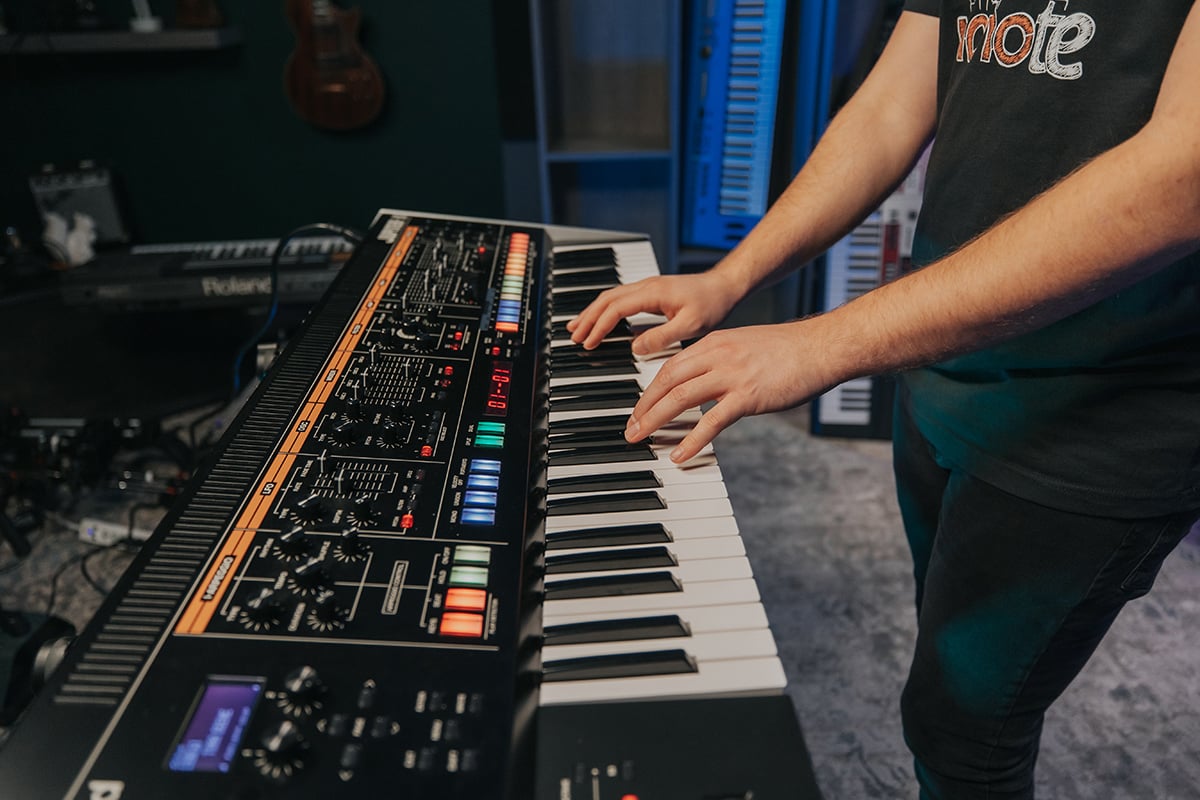
You can find many excellent free resources these days, and you can learn entire songs on YouTube without spending a buck. As YouTubers who publish free lessons every week, we love that YouTube makes music education accessible.
So, free stuff is great. But to really know how to play piano, a more structured, step-by-step approach is ideal.
If budget is tight, you can start with a paid course or two to master the foundations, then use free tutorials to boost your knowledge. At Pianote, we offer Getting Started on the Piano for free and several stand-alone courses for those not ready for a membership.
Finally, online courses take a more traditional approach by giving you videos to watch, assignments to do, and exercises to practice. The advantage of video learning is you don’t need to be tech-savvy.
The disadvantage of online courses is that, again, there’s no real-time one-on-one feedback. However, you can mitigate these challenges with the tips we’ve shared.
And honestly, it’s hard to beat the savings.
Overall, one of the most important things in our opinion is having a community — whether online or in-person — that can offer you advice, critique, and a second ear.
Another important thing is choosing a method that challenges and motivates you. Gamified learning is fun and addictive, but we’ve also heard that they can be lacking for students eager to learn more advanced music.
Motivation can be difficult when you’re self-learning, so let’s go over some practice habits that can help make online lessons work for you.
Make the most of online lessons.
Yes, it’s possible to learn piano online, saving time and money. But if you do, there are some best practices you should be aware of. Some of these we’ve mentioned already, but they’re worth repeating.
We can’t understate the importance of good technique. And until technology advances further, the best way to improve technique is with a human expert.
So consider getting something like a monthly instructor. Or find a friend who is a more experienced pianist, who can give you periodic advice.
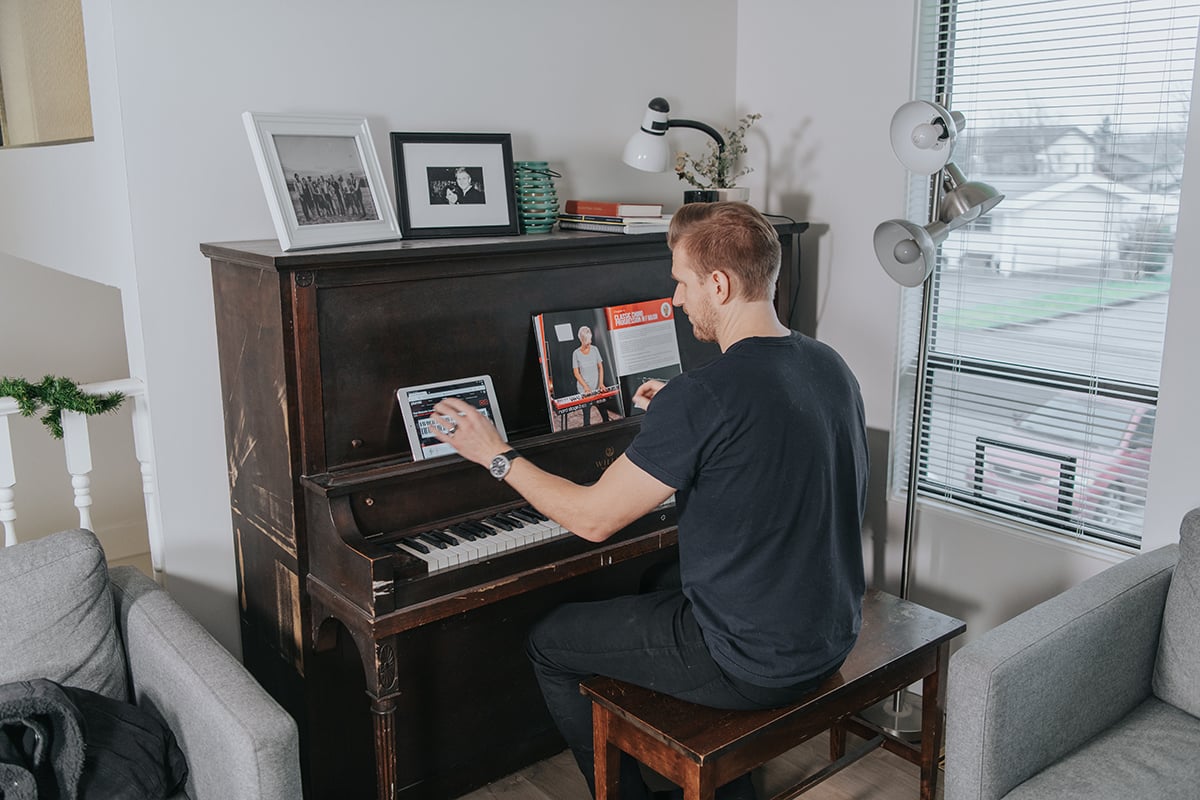
Find a learning program that doesn’t gloss over the foundations. It’s worth investing time and money in the basics:
Once you gain a solid foundation, you can move towards more self-directed learning such as free YouTube tutorials.
Just like you would go to your teacher’s house every Saturday, make a commitment to learn piano on X days for Y amount of time.
Even setting aside 10 minutes to practice makes a big difference. And often, the hardest part is starting. If you can sit down, you’ll likely end up practicing for more than 10 minutes. So find a chunk of time when you won’t be distracted and reserve it as piano-time. Better yet, have goals.
Set goals that are:
SPECIFIC
“My goal is to play ‘Prelude in C Major.'”
MEASURABLE
“My goal is to play ‘Prelude in C Major’ at the correct tempo and have it memorized.”
ACHIEVABLE
“I have played pieces slightly easier than ‘Prelude in C Major,’ so it’s a realistic piece to learn.”
RELEVANT
“I want to play ‘Prelude in C Major’ because it’s my dad’s favorite piece and I want to surprise him on Father’s Day.”
TIME-BOUND
“I will learn ‘Prelude in C Major’ — memorized and at the right tempo — by Father’s Day!”
If you need help setting goals, check out the Pianote Practice Planner.
Let’s level here: learning piano isn’t easy. You’re bound to run into difficulties. You’re bound to have days when you don’t want to practice AT ALL.
Learn to expect this. And when it happens, remember your why.
Why do you want to learn piano in the first place? To pick up where you left off from childhood lessons? To play that one hit by Elton John that changed your life? Because you want to play like Lang Lang?
Whatever your reason for learning piano, that’s the reason you’ll keep going.
This is my favorite tip of Lisa’s. Check in with yourself after practicing to remind yourself of the joy of music.
You’ll probably be in a post-piano high after a practice session. Music does incredible things to your brain and your mental health, so when you’re in that good mood, remind yourself that this is worth it!
Piano players tend to be isolated. But having worked with our friends in Drumeo, Guitareo, and Singeo, we’ve learned just how valuable having a community is. You can troubleshoot problems together, get a second opinion, or simply have people to talk nerdy music stuff with. Friendly competition can also keep you challenged and motivated.
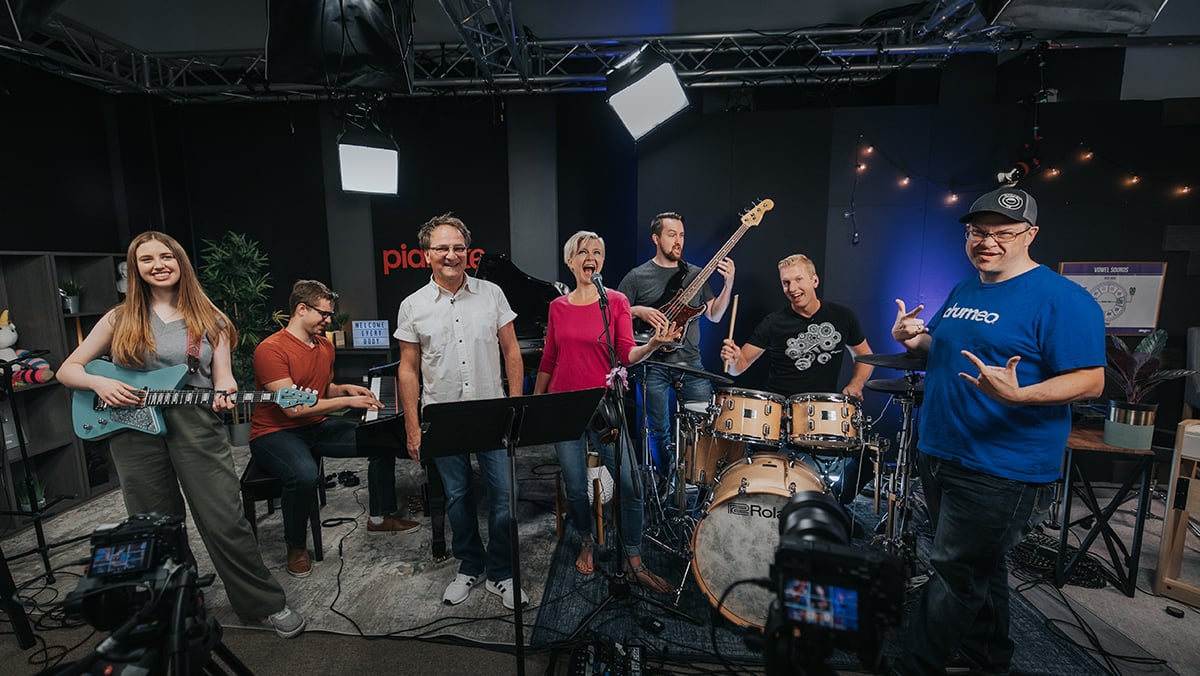
Those are our tips on how to make learning piano online work for you. We hope you feel inspired, and if you’re interested, keep reading to see how Pianote may fit with your learning needs.
The Ultimate Online Piano Lessons ExperienceTM
At Pianote, we strongly believe in making music education accessible. We want to keep things affordable, but we’re also aware of the shortcomings of online learning.
So, these are the things we’ve invested in:
Pianote members can ask questions and get personalized guidance from real teachers. Just upload a recording of yourself for Student Focus and enjoy personalized critique. (Important note: Student reviews are not private, but our community is very supportive and we strive to make everyone feel safe.)
In 2022, we launched Coaches. This means you get access to world-class musicians such as Victoria Theodore, who has played with Stevie Wonder, Beyoncé, and other big names.
We’ve worked hard to design an easy-to-use interface that includes tech like the Play-Along feature and backing tracks that make you feel like you’re playing in a band. And while our approach is far from video game learning, we do gamify the learning experience with experience points (XP) you can earn to ascend levels.
The point of piano isn’t to play scales and chords; it’s to PLAY SONGS! As a Pianote member, you’ll gain instant access to our rich song library. Say good-bye to hunting for inaccurate sheet music and chord charts because we’ve got you covered!
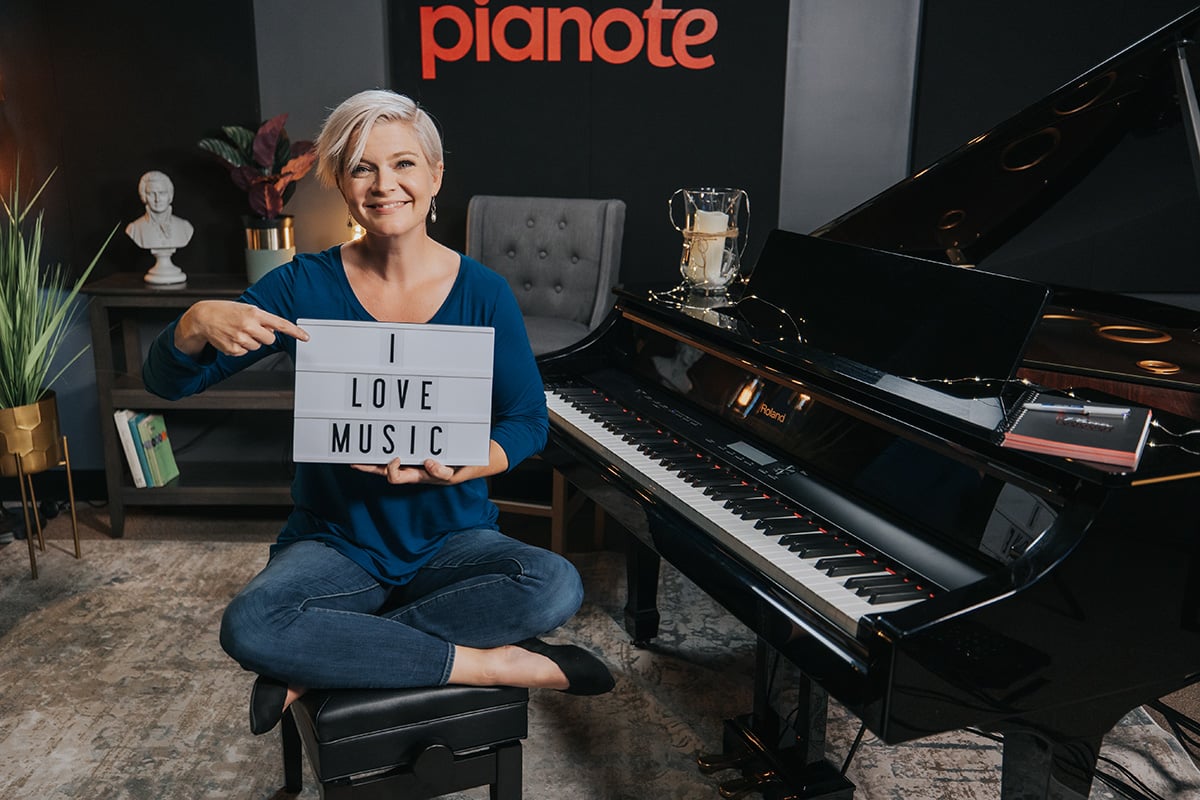
The best way to learn music is by playing, not reading. Start off on a good note with our 500 Songs in 5 Days course pack. Free with your Pianote membership or buy it separately.
The Pianote Method is a step-by-step guide to learning how to play piano. In ten levels, you’ll go from never having touched a piano before to playing performance-ready music. It’s designed by Lisa Witt, who’s been teaching for 20 years and is popular on YouTube for her warm, engaging, and empathetic approach.
Finally, the Pianote forums and Facebook group is where you’ll be welcomed into what we think is the best online community of piano players! It’s one of our favorite things about Pianote 🙂
If you want to get a sneak peek behind the scenes, watch this vlog or browse our YouTube channel where we post free tutorials every week. And whichever way you choose to learn piano online, happy practicing!
Pianote is the Ultimate Online Piano Lessons Experience™. Learn at your own pace, get expert lessons from real teachers and world-class pianists, and join a community of supportive piano players. Learn more about becoming a Member.
/marketing/pianote/promos/april/banner-bg-m.webp)
We use cookies for traffic data and advertising. Cookie Policy »
/marketing/pianote/promos/april/banner-title.webp)